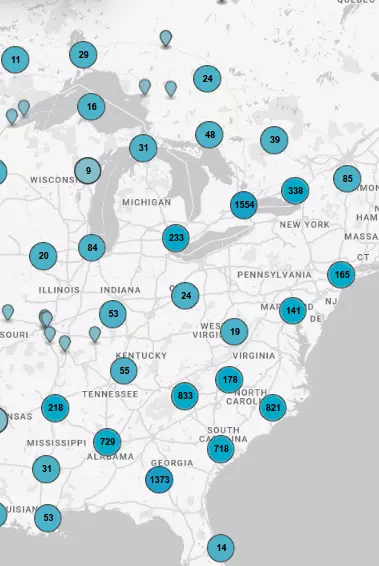Yorkville Branch, Toronto Public Library 1907
Yorkville Branch is the Toronto Public Library's oldest building, the first of four libraries constructed with a 1903 grant from the Carnegie Corporation. It replaced the Library's first branch,...
- toronto
- ontario
- alan brown
York Mills
In 1796, Thomas Mercer, a Loyalist, acquired some 80 ha of land in this vicinity. James Hogg, an enterprising Scottish emigrant, purchased part of this property about 1818 and built a grist-mill...
- toronto
- ontario
- alan brown
Yonge Street 1796
The shortest route between the upper and lower Great Lakes lies between here and Georgian Bay. For John Graves Simcoe, Upper Canada first lieutenant-governor, this protected inland passage had...
- toronto
- ontario
- alan brown
Zion-Wexford Church
In 1842 a little log chapel was built here on a tenth hectare of land purchased from Anthony Twaddle for eight shillings by members of the Primitive Methodist Church. First known as Twaddle's...
- toronto
- ontario
- alan brown
York Mechanics' Institute 1830-1882
The Mechanics' Institute movement began in Britain and soon spread to North America. Its aim was to teach workers the applied technology behind new methods of manufacture and...
- toronto
- ontario
- alan brown
York Mills
The Village of York Mills grew up around three mill sites on the west branch of the Don River about 10 km north of Toronto. From the opening of Samuel Heron's Mill in 1804 until 1926 when...
- toronto
- ontario
- alan brown
Young Men's-Young Women's Hebrew Association
Early in the last century, athletic and social clubs were established to offer recreational opportunities to Toronto's Jewish young people. In 1919, a number of these clubs joined to form...
- toronto
- ontario
- alan brown
York Mills Public School 50th Anniversary Park
York Mills Public School was a two room schoolhouse built in 1925. It was known for many years as Baron Renfrew School, in honour of the then Prince of Wales who used that title while visiting the...
- toronto
- ontario
- alan brown
York Cottage
York Cottage was originally constructed circa 1850 as a one-and-a-half storey brick structure in the Ontario Cottage style. It replaced an earlier log cabin on this site. The Johnson family...
- toronto
- ontario
- alan brown
York's First Jail
In 1798 the Town of York (now Toronto) erected its first jail and hanging yard on this site. Also known as 'the old log gaol', it was still standing when York opened a newer jail in 1827...
- toronto
- ontario
- alan brown
York Hospital Site 1829-1856
When the military hospital closed after the War of 1812, York was left without a hospital. Surplus funds raised by the 'Loyal and Patriotic Society of Upper Canada' for those who suffered as...
- toronto
- ontario
- alan brown
Willowdale
This graveyard is a rare remnant of the time when Willowdale was a small agricultural community centred around this stretch of Yonge Street. Aboriginal peoples hunted, fished, and camped on this...
- toronto
- ontario
- alan brown
William Lyon Mackenzie King 1874-1950
While attending the University of Toronto and reporting for Toronto newspapers, William Lyon Mackenzie King lived here with his parents John King and Isabel Mackenzie, from 1893 to 1896. He then...
- toronto
- ontario
- alan brown
Withrow Avenue Public School Junior
The need for a new school for the Riverdale area became apparent just prior to the turn of the century. Having resolved to provide a school, the Toronto Board of Education approved the purchase of...
- toronto
- ontario
- alan brown
William Thomas 1799-1860
This monument was designed by William Thomas, one of the most important architects in Victorian Canada, and made by Cochrane Brothers, Toronto's leading stone carvers in the mid-19th...
- toronto
- ontario
- alan brown
Weston Public Library
This building was erected in 1914 with a Carnegie Foundation grant to replace the Apprentices' Library at Old Dufferin Hall. Following the William Morris crafts movement, this Art...
- toronto
- ontario
- alan brown
The Warriors' Day Parade
At the end of the First World War (1914-1918), activities took place across Canada to commemorate the country's wartime efforts and to honour the over 60,000 Canadians lost. One of the...
- toronto
- ontario
- alan brown
The Western Battery and The Battle of York
Roughly 200 metres southwest of here (near today's Princes' Gates) was the location of the Western Battery - an outer earthwork fortification and artillery emplacement positioned to protect...
- toronto
- ontario
- alan brown
Wellesley Institute
This Plaque is dedicated to the many women and men who graduated from The Wellesley Hospital School of Nursing and served their community and patients so passionately from 1912 to 1998 at which...
- toronto
- ontario
- alan brown
West Market Street
On the south west corner of King and Market Lane Park once stood the Wellington Inn, Terry and Catermole Watchmakers, Peter Paterson's Hardware Store and John Bishop's Butcher Shop. Next to...
- toronto
- ontario
- alan brown
